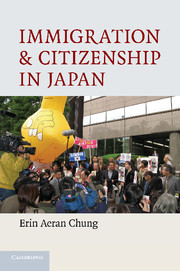Book contents
- Frontmatter
- Contents
- Tables and Figures
- Conventions and Abbreviations
- Acknowledgments
- Immigration and Citizenship in Japan
- Introduction: The Contradictions of Japan's Immigration and Citizenship Politics
- 1 Is Japan an Outlier? Cross-National Patterns of Immigrant Incorporation and Noncitizen Political Engagement
- 2 Constructing Citizenship and Noncitizenship in Postwar Japan
- 3 Negotiating Korean Identity in Japan
- 4 Citizenship as Political Strategy
- 5 Destination Japan: Global Shifts, Local Transformations
- Conclusion
- References
- Index
Conclusion
Published online by Cambridge University Press: 03 May 2010
- Frontmatter
- Contents
- Tables and Figures
- Conventions and Abbreviations
- Acknowledgments
- Immigration and Citizenship in Japan
- Introduction: The Contradictions of Japan's Immigration and Citizenship Politics
- 1 Is Japan an Outlier? Cross-National Patterns of Immigrant Incorporation and Noncitizen Political Engagement
- 2 Constructing Citizenship and Noncitizenship in Postwar Japan
- 3 Negotiating Korean Identity in Japan
- 4 Citizenship as Political Strategy
- 5 Destination Japan: Global Shifts, Local Transformations
- Conclusion
- References
- Index
Summary
Today, everyone feels that Japan's economy and politics have hit a wall.…Japan is a society in which those in power dispense benefits to a narrow body of supporters and force others to conform.…To change this conformist trait, it is essential that Japan be reborn as a society that embraces diversity. Japanese people must tolerate people of different cultures and opinions, respect each other's differences, and try to resolve any social problems through discussion. In short, Japan must become a pluralist democracy befitting an advanced country.
– Masaru Kaneko, Asahi Shimbun, Annual Report, 2001CITIZENSHIP, DIVERSITY, AND DEMOCRACY IN JAPAN
In 1986, former Prime Minister Nakasone Yasuhiro commented that the “considerable number of blacks, Puerto Ricans, and Mexicans” lowered American literacy and intelligence. He explained that Japanese intelligence levels were higher because of Japan's racial purity (New York Times, 27 September 1986). Two years later, Watanabe Michio, the former foreign minister of the Liberal Democratic Party (LDP), made a derogatory comment about U.S. African Americans' propensity toward financial delinquency. Again, in 1990, Japan's Justice Minister Kajiyama Seiroku compared foreign prostitutes in Tokyo to African Americans who move into white neighborhoods in the United States and “ruin the atmosphere” (New York Times, 18 October 1990).
This series of controversial remarks cannot be attributed simply to the ignorance or hubris of high-ranking officials in Japan.
- Type
- Chapter
- Information
- Immigration and Citizenship in Japan , pp. 173 - 184Publisher: Cambridge University PressPrint publication year: 2010



